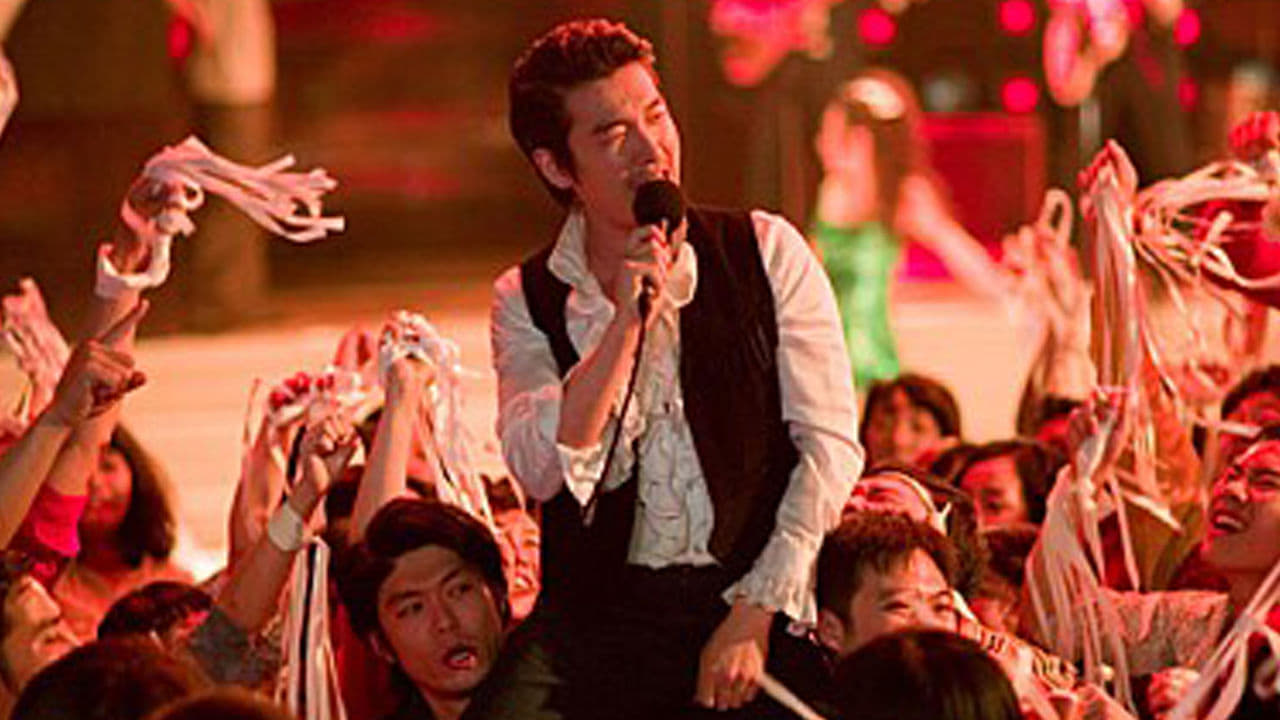By Chlotrudis Independent Film Society
Rating: 4 cats
Director: Ho Choi
Starring: Kwang-ho Hong | Min-a Shin | Min-cheol Choi | Seung-woo Cho | Seung-wu Cha

Original language title: Gogo Chilship
Country: south_korea
Year: 2009
Running time: 117
IMDB: http://www.imdb.com/title/tt1205556/
Jason says: “What does a classic rock & roll movie need? A new sound. Rebellion against authority. Strife within the band. A girl. Clubs. Maybe a writer. And, of course, music that rocks, even if a generation has passed since the film’s events. GO GO 70’S delivers right down the list, to a greater or lesser extent, telling the story of a band, and a country, that needed to rock.
“The time: 1969. The place, Kyungsang Province, right on the border between the Koreas. In a bar catering to American GIs, Im Sang-kyu (Cho Seung-woo) unenthusiastically fronts a country & western trio. After the gig, he and the band head across town to check out another show, where Man-sik (Cha Seung-wu) is demonstrating that he has neither the voice nor command of English to sing James Brown. Things get wild, both trios end up on stage, and as they bond over their love of ‘black music’ afterward, they opt to join forces as ‘The Devils.’ They’re soon headed to Seoul for a battle of the bands, with Mimi (Shin Min-a), who may be as fond of the music as she is of Sang-kyu, in tow. It’s not a great time to be trying something new: Martial law is being declared, and Sang-kyu is a draft dodger. Still, some ingenuity on the part of writer/promoter Lee Byung-wuk (Lee Sung-min) gets them a regular gig, and a little sex appeal injected by Mimi creates a go-go sensation! But once you reach the top, the fall is inevitable.
“GO GO 70’S is an affectionate look back at The Devils. Other filmmakers may have chosen to play up any sort of rift between Sang-kyu and Man-sik, delved deeper into the relationship between Sang-kyu and Mimi, or taken a broader look at what it calls the first generation of Koran rock & roll (there are hints of a rivalry with another band, The Phoenixes); writer/director Choi Ho does not. There’s a very brief bit of conflict in the middle, as Sang-kyu is upset that between the others’ side gigs and the popularity of the ‘go-go’ style, they haven’t written much new music and have drifted from their soul roots, but the story goes off in another direction fairly quickly.
“That leaves the story somewhat lightweight in the interpersonal drama department, and Choi fills much of the gap with music. There’s a lot of performance scenes in the film, enough that it gets somewhat repetitive at points: I really don’t need to hear ‘Mustang Sally’ sung in a Korean accent ever again. There’s a bit of a purpose to that, though – hearing the same song a few times shows what Sang-kyu brought to the group, or how the go-go style sucked a bit of the soul from the performance. There’s a scene where the same song is performed twice in a row, so we can hear the difference between them backing someone else on a traditional folk song and how they make it their own for the B-side. We do hear them improve, and when we finally hear them playing something that is unquestionably their own toward the end, we appreciate both Sang-kyu’s discomfort playing standards and what rock & roll means in a place and time like 1970s South Korea. It certainly doesn’t hurt that these are classic songs, and whether Choi is using new recordings or the original Devils versions, they sound great in the movie.
“I don’t know anything about the band other than what I saw in the movie, so I can’t say whether they played their own instruments, sang for themselves, or were particularly faithful to the real-life Devils. They’re enjoyable in this film, though. Cho Seung-woo settles into a nice combination of diva and musical purist; without appearing to be a fanatic, he still exudes commitment, even to the point of appearing almost asexual where Mimi is concerned. Shin Min-a is a charmer in that role; as much as the others know music, she’s probably the smartest and most organized of the group, and she’s got a nice way of Mimi playing on her sexuality without seeming overly coy or what other characters refer to as a ‘Yankee whore.’ Choi Min-cheol is memorable as the laid-back sax player, and it’s fun to watch Lee Sung-min’s Byung-wuk go from smooth to nervous as the government cracks down.
“The seventies and eighties were likely a time of greater social turmoil in Korea than the sixties were in the U.S., and stories about kids who just want to rock and roll during this time period aren’t destined for completely happy endings. GO GO 70’S doesn’t shy from that, but it also never loses sight of how, no matter what’s going on right outside the club, the music itself can make you feel like anything is possible. 4 cats”
“Seen 15 July 2009 at Concordia Theatre Hall (Fantasia Festival)”
